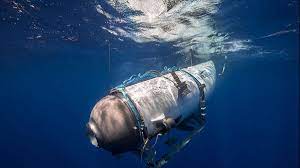Global panic is mounting as the international search for the missing submersible used to tour the wreckage of the Titanic, named Titan and operated by OceanGate Expeditions – whose CEO is currently on board piloting the vessel – enters its third day.
All communication was lost with the 21-foot (6.5-metre) craft shortly after its descent on Sunday to view the remains of the British passenger liner, which lies in a watery grave nearly four kilometres below the surface of the North Atlantic.
Experts say just 30 hours of breathable air are left inside the vessel. It’s worth noting that this estimate doesn’t necessarily take into account the five passengers on board whose panicked movements and rapid breathing may accelerate the speed at which oxygen runs out.
US and Canadian coast guard ships and planes are currently scouring 7,600 square miles of ocean — larger than the US state of Connecticut — for the vessel.
Yet so far, the mammoth search-and-rescue efforts via air and ship have failed to yield any results.
Experts had warned of ‘catastrophic’ outcome
As the race continues to locate the small, deep-diving vessel, controversy has shrouded the expansive search, with maritime experts questioning why the submersible — which was built using camping parts from an RV supplier and had faced several safety issues in the past — was allowed to make the trips in the first place.
A terrifying detail has since emerged – the primary control of the Titan is a 2011 Logitech gamepad controller. Down at depths as crushing as those the Titan dove to, using GPS tracking is not an option. Instead, the crew receives instructions from a team on the surface vessel above via a text messaging system.
On board, the pilot – in this case, OceanGate CEO Stockton Rush himself – steers the vessel based on these instructions using the outdated gaming controller.
As rescuers scramble against the doom of a ticking clock, more is coming to light about the warnings levelled at OceanGate since the Titan was first constructed. Documents show that the firm was repeatedly warned by experts of potentially “catastrophic” outcomes due to the way the vessel was developed.
‘Potential extreme danger’
David Lochridge, OceanGate’s director of marine operations, filed a report in 2018 stating that the craft under development needed more testing, and that passengers might be facing “potential extreme danger” when it reached crushing depths, according to a lawsuit filed that year.
In response, OceanGate sued Lochridge, accusing him of breaching a non-disclosure agreement. Lochridge filed a counterclaim alleging that he had been wrongfully fired for raising questions about the vessel’s testing and safety. His concerns included the fact that the Titan was designed to reach depths of 4,000 metres (13,123 feet), where the Titanic rested.
Yet the vessel’s passenger viewport was only certified for depths of up to 1,300 metres (4,265 feet) – and OceanGate would not pay for the manufacturer to build a viewport certified for 4,000 metres, Lochridge said.
The same year, CEO Stockton Rush was sent a letter by the Manned Underwater Vehicles committee of the Marine Technology Society, warning him that his refusal to allow a regulatory body to test the vessel was ignoring “critical” safety components that protects all occupants, according to a copy obtained by US media outlets.
The letter further alleged that the OceanGate CEO was “misleading” customers over the safety of the “experimental” submersible, along with breaching an “industry-wide professional code of conduct.”
These dire warnings, backed up by over 30 experts in the field, were dismissed. When the letter reached Rush, he reportedly read and rejected it, retorting that he would be ignoring the recommendations in favour of OceanGate’s own safety regulations as “industry regulations were stifling innovation.”
Improvised, ‘off the shelf’ components
In 2022, CBS journalist David Pogue took an in-depth look at the Titan, noting his disbelief at “how many pieces of this sub seemed improvised, with off-the-shelf components.”
A previous passenger of the OceanGate submersible, when it also lost contact for a few hours, Pogue said that among the paperwork shown to potential passengers was a chilling waiver which read: “This experimental vessel has not been approved or certified by any regulatory body, and could result in physical injury, emotional trauma, or death.”
“It seems like this submersible has some elements of MacGyvery jerry-rigged-ness”, a bemused Pogue told Rush during an interview. “I mean you are putting construction pipes as ballast.”
Battery issues, thrusters installed backwards
Other startling details have surfaced regarding the Titan’s safety – according to the BBC documentary Take Me to Titanic, in a 2022 dive to the wreck, one of the vessel’s thrusters was accidentally installed backwards, causing the submersible to begin spinning in circles while trying to move forward near the sea floor. This issue was solved by operating the video game controller sideways.
In court filings in November 2022, OceanGate reported that another dive saw the Titan suffer from battery issues, due to which it had to be manually attached to a lifting platform, damaging its external components.
Khaleej Times





